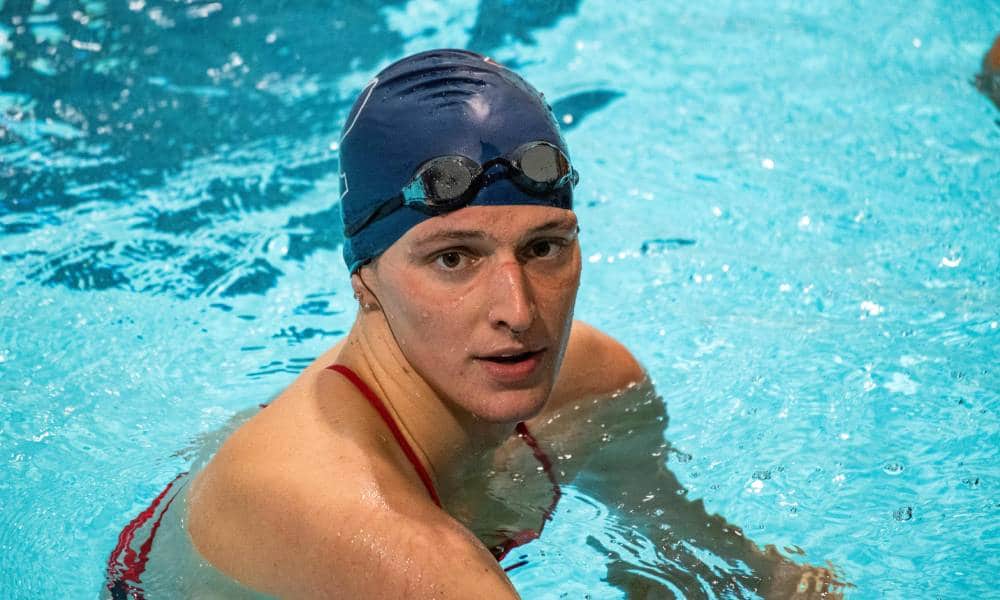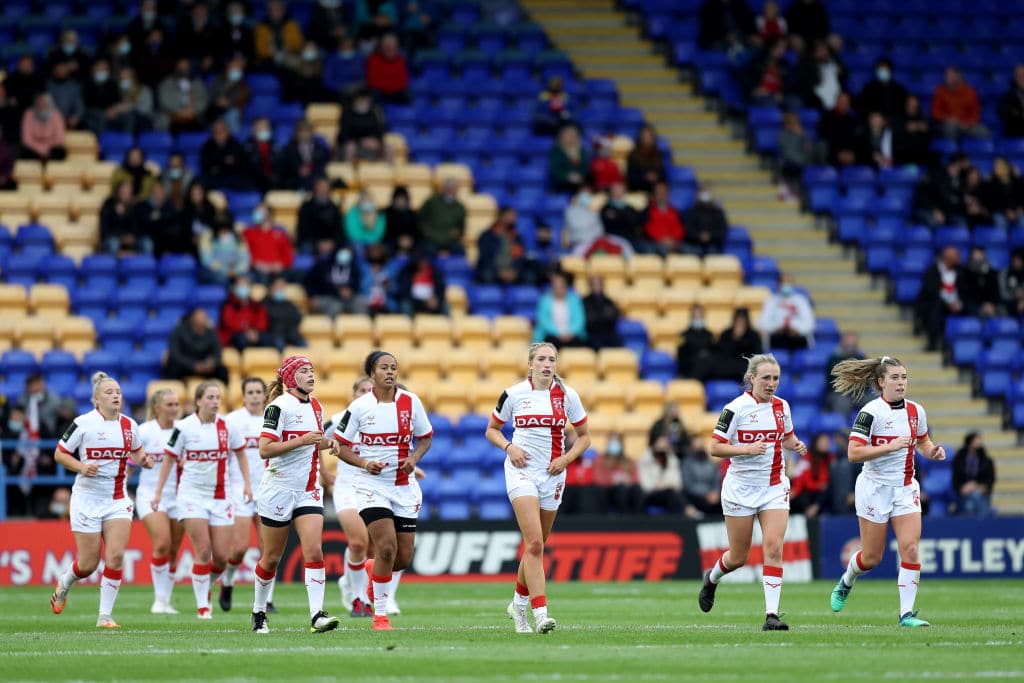‘Unscientific’ trans sports bans will ‘deny trans kids a childhood’, experts say
Author: Josh Milton
International rugby officials restricting trans ruggers will negatively impact society, trans activists warn. (Stu Forster/Getty Images)
Trans sports bans and restrictions won’t just hurt athletes – they’ll impact grassroots players and fans, right down to schoolchildren, experts have said.
The International Swimming Federation (FINA) effectively banned trans swimmers on 19 June. Under the body’s new guidelines, a trans woman would only be eligible to compete at an elite level if they have “not experienced male puberty” before the age of 12.
The International Rugby League came next. It barred trans women from competing in international competitions until at least the end of the year as it reviews its “trans women inclusion policy” – rugby union bosses have already enacted a similar ban. FIFA and Worth Athletics are now reconsidering their own trans inclusion policies.
The International Rugby League’s decision came as a body blow to Emily Hamilton, a trans woman.
Hamilton started playing rugby when she was just six, in 1983. She went on to play in 18 seasons. To see the sport she loves say women like her shouldn’t play with other women was painful.
“The very thing that’s now weaponised against me as a trans woman is that I’m incredibly tall, so I played the second row for the entirety of my career,” she tells PinkNews, “but it means I was able to play a sport that took advantage of all differences in body shape.”
Hamilton is co-chair of QuinsPride, the world’s first professional club rugby LGBTQ+ fans’ group. She’s been a fan of the Harlequins, a union club in Twickenham, south-west London, for as long as she can remember.

Rugby officials say bans on trans women – whether temporary or not – may be needed for “safety” issues around trans women tackling cisgender women.
World Rugby said that in a collision sport where there’s typically at least one injury per match, “safety and fairness cannot presently be assured for women competing against trans women in contact rugby”, while a draft policy from the Rugby Football Union in 2021 said trans women who are taller than 170cm, weigh more than 90kg or both should undergo a “risk assessment” to decide if they’d pose a threat to cis women.
Hamilton says that 65 per cent of the current England women’s national rugby team would fail this risk assessment because of their height and weight. “But they’d be fine because they’re cisgender,” she adds.
There are no examples of trans women causing serious harm to a cis player, says Karl Ainscough-Gates, the chair of the World Rugby-recognised umbrella organisation International Gay Rugby. Even then, “as soon as you take a step on the pitch you have a risk of injury – it’s a contact game, we don’t try to hide that”.
He claims that rugby league officials launched the policy review without discussing it with International Gay Rugby – a move that baffles him, considering the group is the umbrella organisation of the LGBTQ+ rugby community, representing inclusive member clubs across the world.
“But we’d happily work with them and share our knowledge of the community and come to some sort of arrangement,” he says.
What does the science say on trans athletes?
Data on the purported risk to cis athletes posed by trans athletes is scarce, and concerns over player safety ring hollow when trans men are freely permitted to play on men’s teams as long as they sign a waiver that they’re “happy to get injured” for the sake of playing alongside cis men.
“So why are they doing this?” asks Ainscough-Gates. “The reason is anti-trans lobbying groups. They’ve got the power – and the money – behind them because of their personal prejudice.”
One reason sports administrators are limiting trans athletes certainly isn’t science, says Joanna Harper, a Loughborough University researcher who has long studied transgender athletes.
While some international bodies such as FINA haven’t technically “banned” trans athletes, they might as well have considering the eligibility requirements are so limiting.
Indeed, “it doesn’t ban anyone because no trans swimmer has swum at international levels”, Harper explains. “So no one is being banned by FINA.”
FINA’s restrictions are based on perceived differences between male and female rather than between cis and trans athletes, Harper says. “In that sense, it is based on science – just not the right science.”

There is little to no scientific research on the performance of trans athletes at the highest levels of sports. While some studies have pointed to potential residual strength and muscle mass advantages in trans women, some researchers have stressed two things: biological sex isn’t straightforward and testosterone doesn’t play as big a role in sports performance as people think.
It’s also difficult to research a group of people who are so few and far between. In American women’s college sports, for example, there are around 200,000 athletes competing. Of them, one researcher estimate, there are about 50 trans people.
Even so, Harper says that while right-wing politicians and sports officials obsess over the perceived advantages trans athletes have, their disadvantages seem far less interesting. What anti-trans participation rules really amount to is a solution to a problem that doesn’t really exist.
The increasing number of sport bodies reviewing their trans policies this year is coinciding with a wave of anti-trans sports bans in the US. State legislators, mainly in Republican states, are proposing or passing cruel laws that ban trans girls and teens from competing in women’s sports.
By March alone, more than 160 anti-LGBTQ+ laws had been proposed by Republican legislators. Many of them target trans children’s access to gender-affirming healthcare and playing sports.
Such sports bans are in no way backed by science, Harper says, but something far worse – “politics”. When the Associated Press asked lawmakers who sponsored legislation focusing on trans athletes for an example – any at all – of trans girls in sports, they came back with nothing.
“Attacking trans people – athletes in particular – is far more successful than attacking gay, lesbian or bisexual people,” Harper says. “This has become the attack of choice for those who wish to damage the queer community.”
Anti-trans sports bans will ‘deny trans youth a childhood’, warns charity
Stonewall, Britain’s largest LGBTQ+ charity, says sports officials making it more or less impossible for trans athletes to compete is part and parcel of the wider rise in transphobia seen in the US and the UK.
“The inflammatory rhetoric surrounding the issue of trans inclusion in elite competition only serves to perpetuate an atmosphere where trans people feel unwelcome to play community sport with friends, or go to the gym,” Stonewall says.
As the vexing debates and policy reviews show no signs of ending anytime soon, the charity Mermaids warns that if anyone is going to take a hit from these restrictions, it’s trans youth.
Both Mermaids and Harper say they have heard from trans children, parents and coaches worried about what the rulings may mean for them.

“Sport is a fundamental part of childhood, teaching young people important life lessons about teamwork, navigating new environments, building confidence and making friends, and has numerous physical and emotional benefits that make us who we are,” a Mermaids spokesperson told PinkNews.
“To exclude trans, non-binary and gender diverse young people from such experiences is to deny them a childhood.”
Barely any trans children play sports as it is, a report from the Human Rights Campaign found. Just one in 10 trans boys and trans girls play sports in America – and experts expect this number to drop as the debates over the rights of children continue.
The International Rugby League says it are reconsidering whether or not trans women can compete in order to weigh up “fairness” with “inclusivity”.
But Hamilton struggles to see the “fairness” in restricting the rights of trans folk, especially trans young people.
“Young trans athletes will see a level of vitriol aimed at them that will then bleed into their life,” says Hamilton. “Are they worthy? Are they equal? Are they people who can live in a fair society?”
Actual Story on Pink News
Author: Josh Milton




